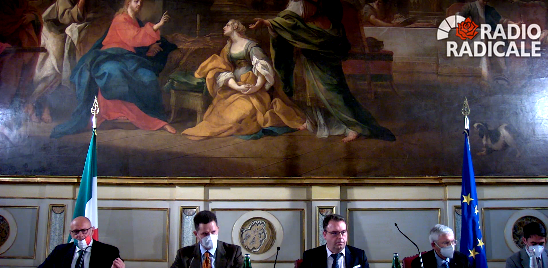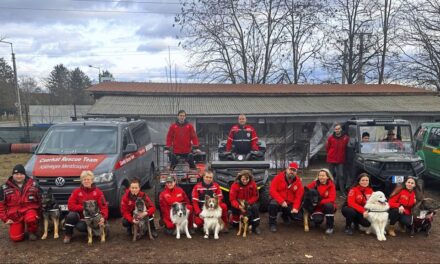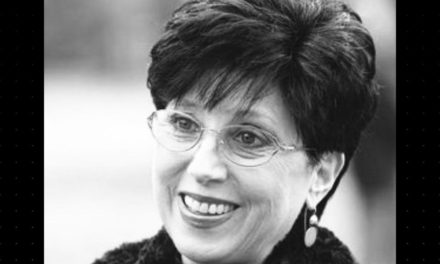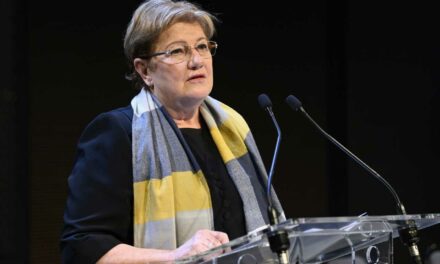As you know, we held the EuCET III on October 15-16, 2021. congress, at which civil leaders of 14 countries from Europe were present. Continuing the cooperation, Károly Lóránt, EuCET's expert in charge of international relations, participated in the conference of the Center for European Political Studies, which was held on March 28, 2022 in the Sala Del Cenacolo room, in the House of Representatives of the Italian Parliament, in Rome. We publish his speech here.
"First of all, I would like to thank you for the invitation. It is a great honor for me to be here in the House of Representatives of the Italian Parliament. I represent an NGO called the European Union Civil Cooperation Council. This cooperation council was initiated by Polish and Hungarian NGOs and was officially established in Budapest in 2019 with the participation of representatives of a dozen Central and Western European countries.
Our goal is to create a strong European movement capable of giving the European Union a new shape and a new direction. We want a Europe (which) is based on the cooperation of nation-states, a Europe (which) is proud of its Christian roots, its Greco-Roman cultural heritage, its achievements in the fields of science, technology and democratic social construction.
As for me, I am an electrical engineer and economist, now 80 years old. My main job was at the Hungarian National Planning Office, I was a long-term planner, later I worked at the European Parliament, and today I am a journalist and the international organizer of this Civil Cooperation Council.
I think we're living in pretty tough times right now. We face many challenges. Let me mention only a few of them very briefly, because I believe that these topics, that is, the answers to the challenges, will form the material of our joint work in the future. I am representing an organization here, but I am speaking in my own capacity, so what I am going to say is an unofficial position, of course it cannot be, it is just my opinion, as I see the European challenges.
There are many challenges, but I will mention only six of them:
1. Ideological challenges
2. Demographic challenges and immigration
3. Challenges of the European political structure
4. Communication challenges
5. Geopolitical challenges
6. Climate change and energy supply
1. Ideological challenges
I would like to refer to two of the ideological challenges, economic and social ideology.
As for economic ideology, after the Second World War we built peaceful European cooperation and built the European social market economy. We had an economic philosophy according to which a better society is one where the differences between people and social classes are moderated. We managed the economy according to Keynesian principles.
Since the 1990s, this model has changed. With the acceptance of neoliberal economic principles, social differences increased, wealth and with it economic and political power accumulated in the hands of a few dozen large corporations. This ideological shift has undermined the fabric of our societies.
As far as the cultural side is concerned, the cultural philosophy changed at the same time as the economic philosophy changed, and the far-left ideology gained more and more space in social and political life. This is the ideology of the Frankfurt school, whose "critical methods" try to destroy and dismantle our past and historical memories.
While the ideology of the Frankfurt school destroys our society, Karl Popper , the "open society", offer a society without nations, history and soul.
These changes also changed the political landscape. According to John R. Schindler , an American professor who worked for the National Security Agency, For example, they both support immigration, the cultural left because it gradually dissolves the traditional culture they despise, while the corporate right because of cheap labor.
In the Euro-Atlantic region, these two left-wing and right-wing political currents dominate political life and form the so-called background power, which is above the democratic political structure of the nation-states.
2. Demographic challenges and immigration
When I worked in the European Parliament, I developed a demographic model for Europe. The result has been that if today's trends continue, within two centuries the original European population will disappear, and by the second half of the century Western Europe will have a majority Muslim population along with Muslim culture. If we want to change these trends, we first need more children from our societies. This is not only a financial issue, but above all a question of culture and identity: do we want our nation to survive? We answer that yes, we want to.
3. The challenge of the European political structure
In the last two years, there has been a debate about the future of the European Union, and there is strong pressure for centralization, for a federal European state. However, a federal state is neither desirable nor possible in Europe.
It is not possible, because a federal state like the United States or Germany needs a common budget that is about 20-25 percent of GDP. No European country wants to pay more than 1-2 percent for common expenses, so there is no economic basis for a federal state.
On the other hand, as the Commission's own polling institute, Eurobarometer, showed that 90 percent of Europeans believe that they belong exclusively or primarily to their own country and then to the European Union, there are simply no European democrats, only different nations in Europe .
Today's centralizing tendencies would lead to a European empire - a definition that comes from the President of the European Commission, Juan Manuel Barroso , as you probably know.
A European empire would be an undemocratic political construct without any popular control, and we don't want that.
You probably remember the European Convention held in 2002 and 2003. Of course, the goal of the leaders of the European Union with this congress was to give a constitution to the European Union, as if it were a federal state. The Europeans opposed this. In two countries, France and the Netherlands, the constitution was rejected in referendums , and even the Treaty of Lisbon was rejected in Ireland in the first vote.
At the same time, however, different ideas emerged regarding the future structure of Europe. These ranged from the free market agreement to the federal state, but there were intermediate solutions as well, such as the "Olympic circles" Flexible cooperation, multi-level Europe, localization, and perhaps the most favorable for us is the confederation of nation states, which is a loose cooperation, cooperation there , where necessary for the sake of the common goal, but otherwise each country lives according to its own specialties.
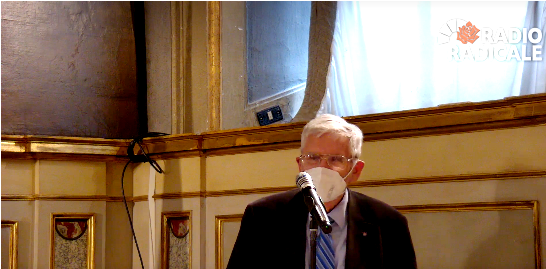
image: Screenshot
4. Communication challenges
The communication space determines people's way of thinking.
In the past three decades, a huge concentration has been observed in the field of media , be it TV broadcasts, newspapers, Facebook or any other form of communication. The Euro-Atlantic communication network is in the hands of several large corporations that belong to the so-called background power and, of course, spread its ideology and political ideas.
In order to popularize our political views and strengthen our national and European identity , we need a communication space where we can also reach wider sections of society.
5. Geopolitical challenges
The basic question here is whether Europe has its own geopolitical interest.
Right now there is a very serious conflict between Russia and NATO.
I think everyone is familiar with the Monroe Doctrine, the essence of which is that America belongs to Americans. By analogy, we can also say that Europe belongs to the Europeans, which means that we want to solve our problems ourselves without the intervention of the United States.
For example, this war in Ukraine is not our war. At the NATO summit in Bucharest in 2008, both France and Germany opposed the expansion of the organization to Ukraine and Georgia. France and Germany are the axis of the European Union, who initiated this Union and could not enforce their opinion. The price has been and will be paid by the people of Europe, regardless of whether they are Ukrainians, Russians, Germans or Italians.
Even worse, we are now facing a nuclear war, a European nuclear war. I believe that we must make our voices heard to prevent today's conflict from escalating into nuclear war.
6. Climate change and energy supply
As I know, there will be a conference here in the second half of the year on this very important issue. This time I just want to make a few comments to indicate that I have written a book about this in English and I can offer this book in electronic form to anyone who needs it.
Very briefly, my point is that the direct link between climate change and atmospheric carbon dioxide is questionable. The warming of the Earth after the Little Ice Age in the Middle Ages began much more before the carbon dioxide content of the air began to increase. Even if Europe were able to achieve net zero emissions, emissions would continue globally.
It is impossible to achieve carbon neutrality with wind and solar energy because too much land is needed and the electricity cannot be stored. The hydrogen economy is too expensive. If we want to reduce carbon dioxide emissions, the only viable solution is nuclear energy.
What to do?
There is a Chinese proverb that says that if you want to defeat the tiger, you must first defeat it in theory. We need a theory that provides short- and long-term answers to the most pressing problems of the present age and for the future. To this end, we must establish cooperation between our scientific institutions. The relations that are now developing between the Hungarian Mathias Corvinus Collegium and the Italian Center for European Political Studies are a good example of this, which should be expanded. We need to reach out to similar institutions across Europe, those institutions that share the same or similar values as us.
But we also need a communication network to convey our views to broad sections of society. Today, communication systems are in the hands of those who have globalist ideas, ideas that are contrary to ours. They will never spread our ideas and opinions.
However, there are some online magazines that have the same ideas as us, or at least are willing to tell people the truth. These web pages are very often run by just one or more people. They are like partisans. We need to organize these partisans into an army, a network that shares information and can reach broad sections of society.
Finally, we need a civil society network that cooperates and maintains close relations across Europe. We have started this with the Citizens' Coordination Council of the European Union, and I hope that today's event will contribute to the deepening and broadening of our relations.
I would like to thank you again for the invitation and I hope that we can work together in the future to promote our ideas to Europeans and provide answers to challenges that the nations of Europe can accept and follow.”
(Header Image: Screenshot)

